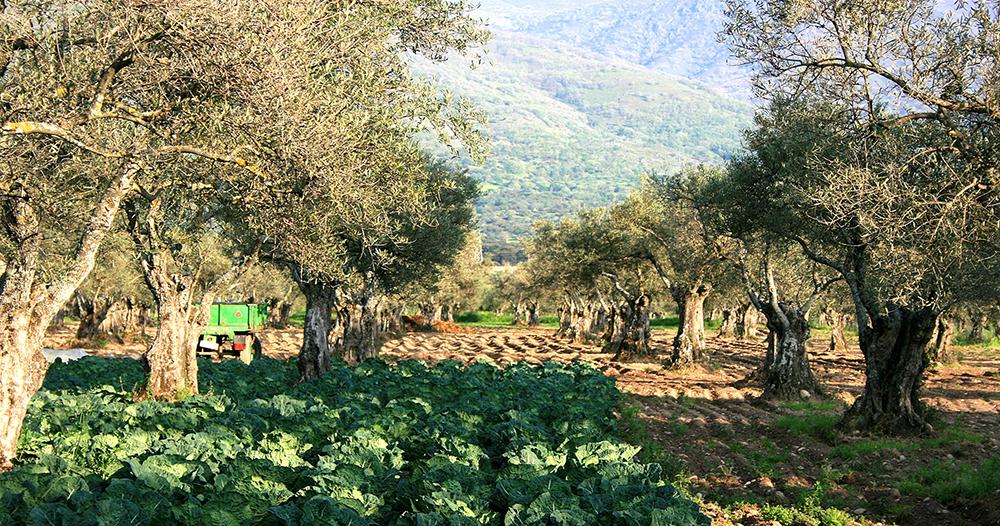- Home
- Worldwide
- CIRAD worldwide
- Projects
- Projet ClimOliveMed
For sustainable olive cultivation in the Mediterranean in the face of climate change - CLIMOLIVEMED

For sustainable olive cultivation in the Mediterranean in the face of climate change © CIRAD
Issues
The project will examine three fundamental questions:
• How can the diversity of olive tree varieties serve as a response to climate change?
The project works to generate new knowledge in order to identify olive tree varieties that are adapted to climate change, based on the world collection in Tassaout (INRA Morocco) and the collection in Porquerolles (CRB olivier France) by characterising a broad spectrum of cultivated varieties and wild olive tree populations.
• How can the diversity of cropping systems and value chains support sustainable transitions in olive production in the Mediterranean?
The project analyses the practices implemented by olive growers to adapt to climate change and documents their perceptions of the impact of climate change on the agro-ecosystems concerned, at three levels: the tree, the olive grove and the farm. In addition, it seeks to better understand the impact of climate change on the governance of the olive oil value chain and the mobilisation of the genetic and phenotypic potential of olive trees in the strategies of actors in the sector.
• How can the knowledge and the genetic resources mobilised by the partners be integrated within the project, but also at the territorial, national and international levels?
Description
ClimOliveMed is based on a partnership between academic and professional actors in the olive sector from the northern and southern shores of the Mediterranean. The project mobilises an approach based on collaborative governance, in which the conventional rules of coordination are not fixed, but evolve over the course of the project according to the concerns and requirements of the different partners. This co-decision process also conditions the success of the project: the involvement and expertise of the professional partners in the project complement scientific knowledge.
This process makes it possible to develop a comparative approach between contrasting olive cultivation situations in southern France (Var and Bouche du Rhône departments) and northern Morocco (Tangier region - Tétouan - Al Hoceïma and Fes region - Meknès).
The scientific approach is also based on the study of two varietal collections, one in the olive biological resource centre in Porquerolles, France, and one in the INRA Marrakesh world olive tree collection in Tassaout, Morocco.
The ClimOliveMed consortium mobilises 16 Moroccan and European partners: research and development centres, international olive sector inter-branch organisations, national inter-branch organisations in Morocco, and managers of olive genetic resource collections in France and Morocco. The involvement and expertise of these partners are complementary to accompany the transition towards sustainable olive cultivation in the Mediterranean.
Expected results
Thanks to the ImpresS ex ante methodology, all of the structures and actors involved in the project have co-developed a common vision and defined mechanisms through which researchers and their partners can contribute to shaping sustainable olive cultivation in the Mediterranean in the face of climate change.
Activity 1: Our objective is to classify the different olive tree varieties according to i) their chilling requirement for flowering, and ii) their ability to adapt to drought. To do so, we study the genetic and phenotypic diversity of olive trees in two Mediterranean varietal collections, one in southern France, and the other in northern Morocco.
Activity 2: We aim to better understand the impact of climate change on olive production systems. To do so, we analyse the practices implemented by olive growers to adapt to climate change and document their perceptions of the impact of climate change on the agro-ecosystems concerned, at three levels: the tree, the olive grove and the farm. We also seek to better understand the impact of climate change on the governance of the olive oil value chain and the mobilisation of the genetic and phenotypic potential of olive trees in the strategies of actors in the sector.
Activity 3: For olive growers, issues concerning adaptation to climate change in olive cultivation systems and olive tree varieties implies the management of complex socio-ecological systems in conditions of considerable uncertainty. They also involve numerous other actors (agricultural technicians, processors, policymakers, genetic resource managers, and researchers from different disciplines) with a wide range of values and perspectives on the nature and the degree of the problems to be considered. We address this complexity with the goal of opening new spaces for dialogue between actors in the olive sector, in research and in international organisations, to collaborate on the design and management of climate change adaptation strategies.
Moroccan partners: Institut National de la Recherche Agronomique du Maroc (INRA); Ecole Nationale d’Administration (ENA) Meknès; Interprolive; Cadi Ayyad University; Sultan Moulay Slimane University; Abdelmalek Essaâdi University; Ibn Tofaïl University.
French partners: Conservatoire Botanique National Méditerranéen de Porquerolles (CBNMED); Parc National de Port-Cros, CNRS; IRD; INRAE; Institut Agro Montpellier.
International organisations: International Olive Council; FAO - TIRPAA
























